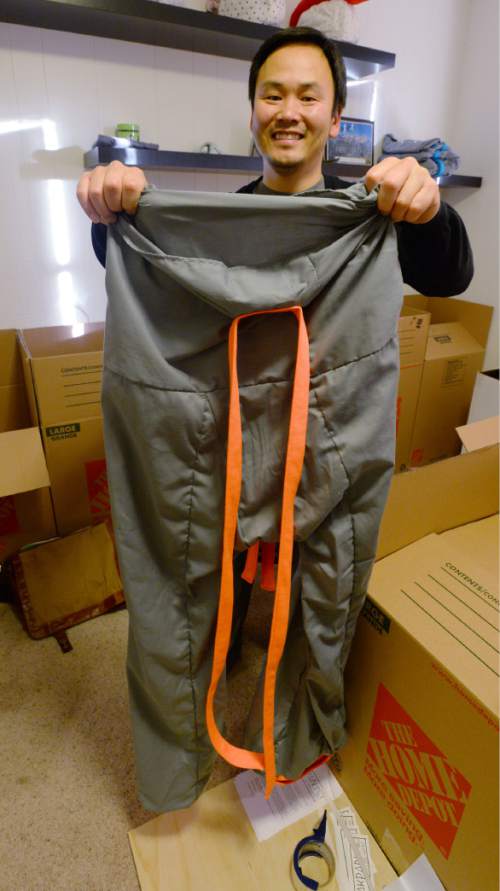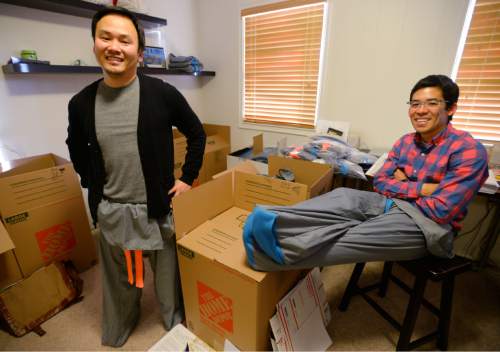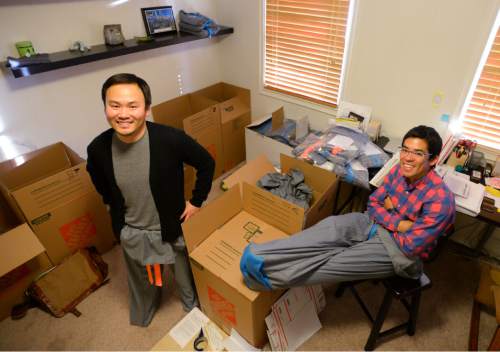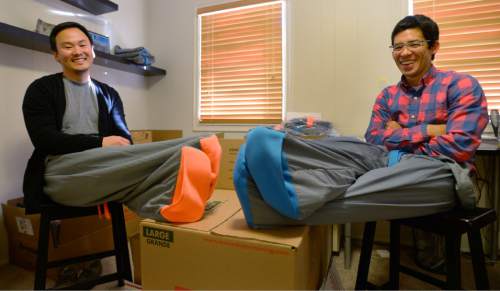This is an archived article that was published on sltrib.com in 2014, and information in the article may be outdated. It is provided only for personal research purposes and may not be reprinted.
Inspiration can sprout from necessity.
Garred Lentz got sick of wrapping his sweatpants around his feet to keep warm each winter, so the student entrepreneur sewed his own fuzzy, over-the-foot version.
Then his inspiration turned into avocation. Lentz's comfy Sakpants — they look like a cross between pajamas and Thai fishermen pants — became the foundation of a business plan last April when he received $3,000 from the University of Utah's entrepreneurship institute.
Since then, MBA student Lentz and business partner Brayden Iwasaki have raised $25,000 on Kickstarter from nearly 500 people who also don't want to bother with slippers or socks.
"We had no idea we'd ever sell more than 10 pairs of these things," said Lentz, who delivered a tongue-in-cheek pants pitch to his classmates because he couldn't think of a better product.
So far, Iwasaki and Lentz have sold about a thousand pairs. And Sakpants are on backorder as a Provo manufacturer tries to keep up with demand.
Lentz and Iwasaki's success comes as colleges nationwide develop entrepreneurship programs to help students adapt to a changing job market and spur growth in their surrounding communities. Advocates of university entrepreneurship programs say the trial-and-error nature of college campuses allows students a safe environment to try out their ideas before launching them in the "real" world.
In Utah, the Sakpants businessmen aren't alone. Ample "seed money" is available for student entrepreneurs across the state — even if their startups eventually stall out. Most of the cash comes from outside donors and goes to students who give winning pitches at business competitions.
Zion's Bank is a large donor to the U. program, whose budget has doubled in the past few years, said Troy D'Ambrosio, executive director of the Lassonde Entrepreneur Institute.
"We're giving money to them and hoping they do the right thing with it," D'Ambrosio said. "It gets that catalyst, that little bit of spark to get the momentum rolling."
For the 5,000 would-be CEOs in the university's entrepreneurship program, a total of $25,000 in grants is available. Students from other colleges also can apply.
In Utah and around the country, a growing focus on entrepreneurship mirrors a shift in the broader business world: Building a company from scratch is easier now than it was a decade ago. The cost of selling merchandise online has dropped. And business owners don't need as much cash or technical expertise, thanks to 3D printing and an uptick in the number of manufacturers.
"What would have taken you hundreds of thousands years ago, you can do for $10 now," said D'Ambrosio.
That same rapidly developing technology has changed the trajectory of most people's careers, says Utah State University professor Mike Glauser, who runs that school's Clark Center for Entrepreneurship.
Glauser's students today, he says, don't want to work at one company from college graduation to retirement. They want an employer that shares their values, honors their creativity and gives them freedom.
"It's just kind of the new American dream," he said.
As a graduate student in the 1980s, entrepreneurship was not in Glauser's course catalogue. Today, he added, "there is more money available than there are viable business concepts."
At USU, the support comes in a series of competitions with prizes of up to $5,000 — money largely donated by members of the school's advisory board and others.
Likewise, at Brigham Young University's Rollins Center for Entrepreneurship, about $355,000 paid for students to compete in entrepreneurship and technology competitions in 2014.
That funding is up more than threefold from about five years ago, said Scott Petersen, Rollins Center director. Much of the cash came from the Larry H. Miller Group.
Petersen took over as director of the BYU program in 2010 and "retooled all of the courses, almost turning on a dime" he said. The goal is to help students test out their business plans in a trial setting before anyone invests heavily later on, he said.
The training seems to be working: scan.me, which began as a BYU student startup, recently sold for $50 million to Snapchat, the photo-sharing app company.
Back at the U., Lentz and Iwasaki would like to take their business skills beyond pants.
But for now, "We're not out to change the world through technology," Lentz said. "We just want to keep people's feet warm."
@anniebknox









